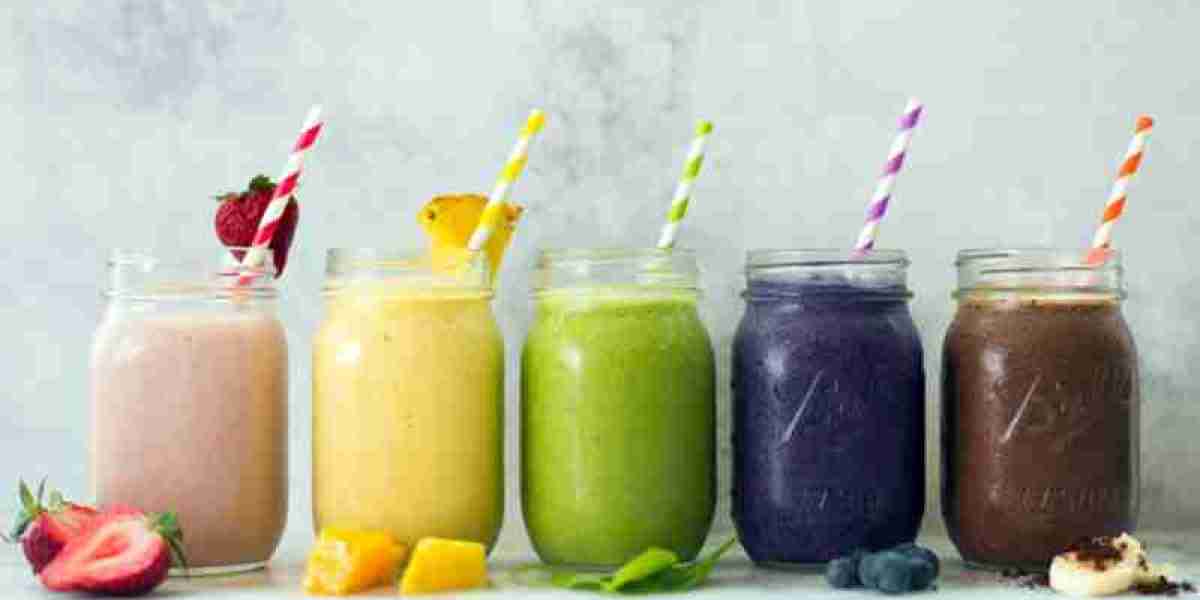The fruit smoothies market is characterized by fierce competition as a variety of brands strive to capture the attention of health-conscious consumers worldwide. The demand for convenient, nutritious, and flavorful beverages continues to rise, with major players leveraging different strategies to enhance their market position. This article presents a detailed competition analysis of the fruit smoothies market, examining the key competitors, their market share, and strategic approaches that shape the competitive landscape.
1. Key Competitors in the Fruit Smoothies Market
Several major companies dominate the global fruit smoothies market, each employing unique strategies to meet the evolving demands of consumers. These competitors vary in terms of product offerings, geographic presence, and branding. Some of the prominent players include:
Smoothie King One of the largest smoothie chains in the world, Smoothie King has established a strong presence in both the U.S. and international markets. The brand is known for offering a wide variety of smoothies, including those targeting specific health benefits such as weight management, muscle recovery, and energy boosting.
Jamba Juice A leading name in the smoothie industry, Jamba Juice is widely recognized for its expansive menu and strong retail presence. The company focuses on creating custom smoothie options with fresh fruits, vegetables, and nutritious add-ins. Jamba Juice has expanded beyond traditional retail stores to include digital ordering, catering services, and partnerships with major retailers.
Tropicana Products (PepsiCo) Tropicana, a household name in the juice industry, has leveraged its established reputation to gain a foothold in the fruit smoothies market. With its wide range of fruit-based beverages, Tropicana offers ready-to-drink smoothies in grocery stores and supermarkets globally. The brand capitalizes on its expertise in juice production to create convenient, healthy smoothies for on-the-go consumers.
Daily Harvest A relatively newer entrant, Daily Harvest has gained popularity with its subscription-based business model, offering frozen smoothie kits delivered directly to consumers' homes. The company emphasizes clean ingredients, organic produce, and plant-based options, catering to the growing demand for health-focused, convenient food solutions.
Naked Juice (PepsiCo) Known for its bold flavors and high-quality ingredients, Naked Juice has become a key player in the market for fruit smoothies. With a product line that includes smoothies, cold-pressed juices, and fruit and vegetable blends, Naked Juice offers health-conscious consumers a variety of nutrient-dense beverages.
Odyssey Smoothies (Nestlé) Odyssey Smoothies, a subsidiary of Nestlé, competes in the premium smoothie category, offering a range of smoothies made from natural fruits, vegetables, and other health-focused ingredients. Nestlé’s strong distribution network and reputation for quality have helped Odyssey Smoothies capture a portion of the health and wellness market.
2. Market Share and Key Segments
The global fruit smoothies market is highly fragmented, with both large multinational companies and small, independent players competing for market share. While multinational corporations such as PepsiCo and Nestlé command a significant portion of the market, smaller, health-focused brands are making notable inroads, particularly in the growing premium and organic smoothie segments.
North America is the largest market for fruit smoothies, with a well-established base of consumers seeking healthy, on-the-go beverage options. Major players like Smoothie King, Jamba Juice, and Tropicana dominate the region, with Jamba Juice and Smoothie King holding substantial market shares in the quick-service restaurant segment.
Europe is experiencing rapid growth in the fruit smoothies market, driven by a strong focus on health, sustainability, and clean-label products. The U.K. and Germany are key markets, with companies such as Innocent Drinks (owned by The Coca-Cola Company) gaining significant market share through its focus on natural, organic ingredients and ethical sourcing practices.
Asia-Pacific represents a high-growth market for fruit smoothies, with increasing urbanization, rising disposable incomes, and an expanding middle class. While the market is still in its early stages in countries like India and China, there is significant potential for growth as health-conscious consumers begin to embrace smoothies as a part of their daily diet.
Latin America is a market with moderate growth, largely due to the region’s abundance of tropical fruits, which makes smoothies a popular beverage choice. Brazil and Mexico are key markets where local players and international brands are competing for consumer attention.
3. Strategic Approaches of Major Competitors
To stay competitive in the dynamic fruit smoothies market, companies are adopting several strategic approaches that focus on differentiation, innovation, and consumer engagement. Key strategies include:
Product Innovation and Diversification Innovation is a key driver for companies seeking to differentiate themselves in the crowded fruit smoothies market. Brands are increasingly introducing new flavors, functional ingredients, and health-centric offerings to attract a diverse range of consumers. Smoothies that provide specific health benefits, such as immunity-boosting ingredients, protein-packed options, or smoothies tailored to different dietary needs (e.g., vegan, gluten-free, low-sugar), are growing in popularity.
For example, Smoothie King’s "Blend of the Day" concept highlights its focus on offering consumers different smoothie options, often based on specific health benefits such as weight management or fitness recovery. Similarly, brands like Daily Harvest emphasize the use of organic, plant-based ingredients to cater to the growing demand for clean-label products.
Expansion of Distribution Channels Distribution is critical in reaching a broad consumer base. Many smoothie brands are increasingly expanding their presence across various distribution channels, from traditional retail outlets and quick-service restaurants to e-commerce platforms and home delivery services. The convenience factor has become a major selling point for consumers seeking smoothies as an on-the-go snack or meal.
Brands like Daily Harvest have capitalized on the subscription-based model, offering customers convenience by delivering smoothie kits directly to their homes. Meanwhile, traditional smoothie chains like Jamba Juice and Smoothie King continue to expand their physical presence through franchising and partnerships with major foodservice providers.
Sustainability and Ethical Sourcing Sustainability and ethical sourcing have become key pillars of differentiation for many smoothie brands. With increasing consumer concern about environmental and social responsibility, companies that emphasize eco-friendly practices, such as recyclable packaging and fair-trade sourcing, are gaining consumer loyalty.
For example, Innocent Drinks, which is popular in Europe, has made sustainability a core part of its business model. The company uses 100% recyclable packaging and sources ingredients from fair-trade certified farms. Similarly, brands like Daily Harvest are tapping into the growing consumer demand for plant-based, organic, and ethically sourced ingredients.
Marketing and Consumer Engagement Effective marketing and consumer engagement are crucial in the fruit smoothies market, especially as consumers become more selective about the brands they support. Social media platforms like Instagram and TikTok have become essential for brands to promote their products, connect with consumers, and create brand loyalty.
Many brands are leveraging influencer marketing and user-generated content to enhance their visibility and credibility. Companies are also focusing on transparency in marketing, providing clear information about ingredients, sourcing, and the health benefits of their smoothies.




